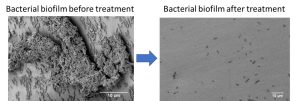
31 Jan A chat with research scientist Dr Nicky Thomas, University of South Australia
Reading Time: 4 minutesDr Nicky Thomas is a Senior Research Fellow at University of South Australia and The Basil Hetzel Institute for Translational Health Research, where he works on developing nanomedicines to treat infections that have become resistant to traditional antimicrobial therapies. Among other concerning and challenging chronic bacterial infections, Dr Thomas’ team has an interest in improving the delivery and efficacy of antibiotics in people suffering chronic urinary tract infections (UTI).
Dr Thomas started his career as a community and hospital pharmacist working in Germany and Switzerland. During this time he became increasingly concerned with people returning for repeat antibiotic prescriptions for infections, particularly recurrent urinary tract infections (UTIs). He retrained in biomedical research so he could work on developing novel therapies to tackle resistant infections and ‘super bugs’. While completing his PhD in New Zealand, he worked on a project improving the effects of anti-malaria medicine.
Dr Thomas joined University of South Australia in 2013 and soon became fully involved in researching bacterial biofilm and resistant infections. In 2017, Dr Thomas founded the Adelaide Biofilm Test Facility at the School of Pharmacy and Medical Sciences at University South Australia, Adelaide. He is now dedicated to finding new treatments that use less antibiotics to get people healthy, including a specific focus on chronic UTI.
 Image supplied by Dr Nicky Thomas
Image supplied by Dr Nicky Thomas
Dr Thomas, can you tell us a little about yourself?
I am trained pharmacist with several years of experience in community pharmacies, hospital and industry. Following my PhD in Pharmaceutical Sciences, I have focused on bacterial infections, in particular those that are associated with chronic infections that are extremely difficult to treat with antibiotics, such as bone infections and UTI.
Apart from my passion for science and providing solutions for real-world problems, I enjoy home brewing (maybe because this also involves microorganism, but much nicer ones).
Can you please explain what your current research is about?
My group uses nanotechnology to make better medicines. Nanotechnology means we make super-tiny containers one billionth of a meter in size which we load with antibiotics. What we see is that bacteria often respond much better to those containers compared to conventional antibiotics. Together with our colleagues in the hospital, we have tested a few technologies with much better patient outcomes—meaning patients get healthy faster, and with less antibiotics.
While we originally focused on sinus infections and slimy biofilms, we have now broadened our scope. Our PhD students have recently developed smart nanocarriers that can: 1) sense and respond to an infection; and 2) penetrate through thick bacterial slime and also penetrate human cells that are infected with bacteria. These conditions are typically found in UTI. While these are ongoing projects, we are confident that some of our technologies have the potential to be game changers.
What is your primary research goal?
Tackling real world problems—finding new strategies against antibiotic resistant infections that otherwise kill millions of people every year.
What do you need to further your research?
Funding, funding, funding. Governments seem to ignore that research is a pillar for a healthy society that will benefit all. Unfortunately, these effects take time and hence, research is often one of the first areas where funding is cut. It is extremely frustrating when you have a potential game changer as a new therapy and you cannot proceed with the research because there is no money in the pot.
We also need collaboration with clinicians. It is a great experience when people with the same goal meet and try to fix a global problem. We already work with surgeons but would like to expand our collaborations to include UTI clinicians. These experts might be able to assist with disease models that we can use to further fine-tune our technology.
Did I mention funding?
Contact details
If you are an Australian or international UTI clinician or researcher interested in chronic UTI and would like to know more, please contact Dr Nicky Thomas.
If you would like to inquire about helping fund this important work, please contact The Institute.
If you want to know more about Dr Nicky Thomas’ work, you can look at the following links:
University of South Australia, Nanostructure and Drug Delivery
Basil Hetzel Institute for Translational Health Research
Adelaide Biofilm Test Facility
CLICK HERE TO SUBSCRIBE TO OUR BLOG
CLICK HERE to visit our FAQ page
Disclaimer: Stories or case studies in relation to personal experiences with chronic urinary tract infection, and links to other websites, are included for convenience and information only and do not constitute a recommendation or endorsement by Chronic UTI Australia of materials in those stories or on those linked websites, or any associated entity, product or service. We have not screened, nor conducted background checks or other investigations in relation to those third parties or the information they supply for inclusion on this website. You should seek assistance from a health care professional when interpreting the materials available on this website and applying them to your individual circumstances. If you have any concerns about your health, consult your general practitioner. This blog is subject to the Chronic UTI Australia website’s Terms of Use




No Comments